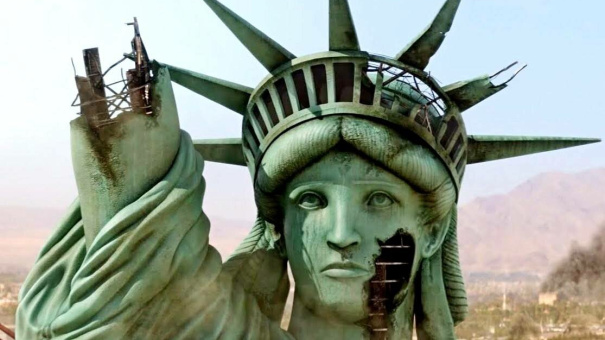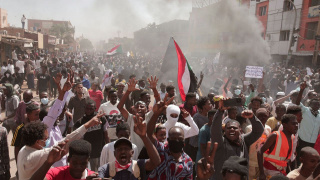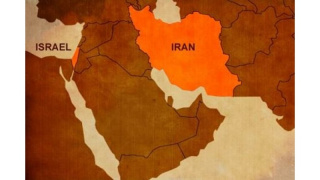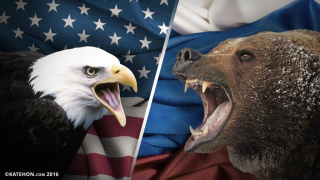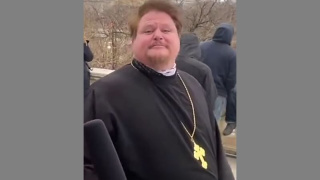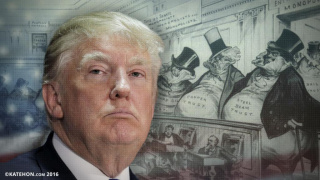America’s Absent Mission
Mr Pat Buchanan made a statement that shows extraordinarily well how abnormal the beliefs of the United States are. He wrote in a recent column,
‘Clearly, among the reasons for our present division and national malaise is that we have lost the great animating cause earlier generations had: the Cold War. Americans have found no substitute cause to replace the Cold War and no substitute adversary like the late Soviet Empire.’
If the US were a ‘Christian nation’, as Mr Buchanan and others claim they are, there would be no need to go searching for ‘great animating causes’ to keep the union together. A true Christian country/ethnos has already decided that the ultimate unifying/animating cause, their highest calling, is the acquisition of holiness, union with God, theosis – for the individual, the family, and for the whole community, whether living, forthfared, or not yet living.
Furthermore, as the Orthodox Christian Faith takes root in a country, there will arise saints who embody the best of the history and traditions of their kinsmen, who become living icons and symbols of their country. Look at any place where the Orthodox Church has flourished and you will find them:
Sts Cuthbert and Audrey (Etheldreda) in England;
St Sava in Serbia;
St Sergius of Radonezh in Russia;
St Martin of Tours in France;
St Spyridon in Cyprus;
Sts Herman and Jacob Netsvetov and Martyr Peter the Aleut in Alaska;
And so forth.
St Kyriakos of Tazlău, Romania, offers a clear illustration of how this works itself out in the life of a nation:
‘ . . . his was a life of exceptional holiness. Believers from the surrounding area have maintained their respect for this chosen vessel, passing his name down from father to son.
‘Saint Kyriakos was born into a peasant family, and became a monk at the Tazlău Monastery when Dositheos was the Igoumen. He was from the nearby village of Mastacăn, a village which today belongs to the community of Borlești.
‘Venerable Kyriakos of Tazlău lived on a knoll in front of the monastery, remaining in permanent communion with divine grace, which first entered his soul at Holy Baptism. He was so pure that he had attained the measure of perfect manhood (Ephesians 4:13). He did not choose such a life when he was an old man, after tasting the sweetness of this fleeting life, but embraced it from his youth, like a fool for the sake of Christ. Since he surpassed the other monks in humility, prayer, and virtue, he was found worthy of the grace of the priesthood.
‘Desiring to attain further perfection, Saint Kyriakos withdrew to a mountain called Măgura Tazlăului, where he lived for fifty years. There he struggled in a manner similar to the great hesychasts of old, sustaining himself with dried bread and fruits, keeping all-night vigils and shedding copious tears. Through the grace of the Holy Spirit, he was able to forsee future events, and to cast out evil spirits.
‘Through solitary prayer in his cell, Saint Kyriakos uprooted the thorns of the passions from his body, and acquired the opposite virtues. The joy of Christ's Resurrection assuaged the sorrows of his soul, and his face shone with the uncreated light of Tabor. He did not experience any discouragement in his struggle with temptations and with evil spirits.
‘In time, many disciples flocked to him seeking his spiritual counsel. These, in turn, became hesychasts and lived in the mountains of Tazlău, Nichitu, and Tarcău.
‘After reaching an advanced age, Saint Kyriakos surrendered his soul to God on December 31, 1660. His disciples buried him in a cave on Măgura Tazlăului, and many miracles took place through his holy relics.’
But ‘America’, generally speaking, will not have saints like this because it isn’t a real, organic entity. It is an artificial union of distinct cultural areas (which are authentic) held together by the threat of force (‘Secede, and you’ll get blasted like the South’) and by the promise of economic prosperity (which is becoming more and more tenuous as giant transnational corporations increase their control over the economy, along with sharp increases in immigration allowed by the federal government).
Saints like those above will only appear in great numbers within the context of those real and unique cultural regions we have discussed before – New England, the South, Great Plains, etc. – as the Orthodox Church enculturates herself amongst them, making prudent use of the good traditions that remain alive within each of them. Indeed, we may have the first such indigenous saint of the South in Bishop Dmitri Royster of Dallas (+2011). But the Church cannot establish herself deeply in a place without an authentic culture. And that, sadly, is what ‘America’ is: a place without an authentic culture. The Orthodox Church will always be something alien in such a place, something whose existence is weak and tenuous. In the same way, the more the cultural regions reject their own unique, authentic identities and replace them with the bland, fake-as-plastic American ‘culture’, the more difficult it will be for the Orthodox Faith to become established within them.
There have been, and probably will be in the future, a few Orthodox saints here and there across the States (thank God for all of them!), such as the ever-memorable St John of Shanghai and San Francisco, St Alexis Toth of Wilkes-Barre, and St Raphael of Brooklyn, but these are and will be mostly immigrants. The Orthodox Church will do what she has done throughout her history in whatever place she finds herself (i.e., create holy men and women), but the ungodly spirit found across most of the US (pride, the passionate pursuit of money and ‘fun’, and so on) makes conditions for the making of saints from their homeborn populations extremely unfavorable.
Lands that have a strong Orthodox spirit have no need of chasing after new fad causes or creating new enemies to vanquish; they are busy imitating saints like the Holy Kyriakos, busy searching within the deep recesses of their own hearts and souls in an effort to tear out the evils that have taken root within them so that the Holy Ghost may dwell within them. This being the case, they are much less inclined to launch military adventures thousands of miles from home or to otherwise meddle in the affairs of other countries, as they have their hands full remedying the evils they see within themselves. Such is not the case with busybody America, which believes it is righteous already and thus can dictate how everyone else ought to live.
America uses the language of Christianity to describe itself and its goals, but it isn’t truly Christian. If it were, there would be, after 400 years of life in North America, a host of saints whom its people could pray to for the healing of soul and body; honoring the Mother of God would be a central part of the national life; prayers for departed Americans would occur regularly; and there would be an intense effort to pass on the Christian Faith to future generations – in the home, in parishes, in monasteries, in schools, etc.
Most do not know about the True Faith here in the States. There is Roman Catholicism (Obey the Infallible Pope, no matter what) and Protestantism (obsessed with an individualistic ‘salvation experience’ that then makes any layman an infallible interpreter of the Holy Scriptures), but all of this ends badly, as we see in what passes for an ‘American icon’ nowadays, the ditzy Golden Girls actress Betty White.
If Mr Buchanan wishes to see the Christian Faith flourish in the States, and to give them a task that will unite them and bring out the best in them, he will need to convince them to repent of the deadly step taken a thousand years ago, when the West ruptured her ties with the Orthodox Church. That would be the crowning achievement of his life, so much of which has been spent in service to the peoples of the US.
